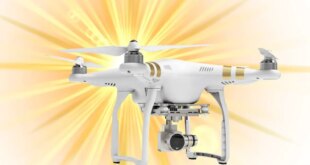Citadel Defense has received a multi-million-dollar government contract for their Titan, an AI-powered, radiofrequency (RF) based counter drone system. Citadel’s technology was selected following a competitive evaluation of two dozen competitive counter small unmanned aircraft systems (C-sUAS).
Titan proved highly effective in complex urban environments and was preferred by operators as it exhibited technical superiority across many unpredictable threat scenarios including drone swarms.
“As the only automated RF sensor solution in the market that uses AI and machine learning to detect, identify, track, and safely defeat uncooperative drones, Titan is a force multiplier for US and allied forces,” explains Christopher Williams, CEO of Citadel Defense.
The Titan protects troops and high value assets against unwanted drone activity and swarms when large and expensive multi-sensor systems cannot be deployed. At locations where integrated systems are installed, Titan serves as the RF defense layer, bringing an industry-leading low false alarm rate, targeted countermeasures, and broadest level of threat coverage to highly integrated counter drone solutions.
The number of commercial drone platforms that pose a threat continue to proliferate and evade legacy C-sUAS systems. Adversaries have become increasingly sophisticated with the technologies used, creating significant challenges for C-sUAS systems that rely on slow-to-update UAS threat-libraries and countermeasures.
“AI, machine learning and adaptive countermeasures are required for the C-sUAS mission. New commercial UAS platforms have over 100 controller settings that can change a drone’s communication signature. Library-dependent and cyber-focused systems simply can’t keep up,” explained Williams.
Bad actors adapt their strategy quickly when they discover a security vulnerability. Williams says, “With hundreds of sensors now deployed, Citadel is helping customers detect shifting trends in drone activity on a global scale to help stay ahead of the threat.”
Under this contract, Titan systems are being delivered in response to urgent needs.
Related Links
Citadel Defense
UAV News – Suppliers and Technology
|
We need your help. The SpaceDaily news network continues to grow but revenues have never been harder to maintain. With the rise of Ad Blockers, and Facebook – our traditional revenue sources via quality network advertising continues to decline. And unlike so many other news sites, we don’t have a paywall – with those annoying usernames and passwords. Our news coverage takes time and effort to publish 365 days a year. If you find our news sites informative and useful then please consider becoming a regular supporter or for now make a one off contribution. |
||
|
SpaceDaily Contributor $5 Billed Once credit card or paypal |
SpaceDaily Monthly Supporter $5 Billed Monthly paypal only |
|

![]()
Unmanned aerial vehicles to scale new heights thanks to NASA
Austin TX (SPX) Jan 26, 2021
NASA is funding a major project on the future of autonomous air cargo transportation, and The University of Texas at Austin will be playing a lead role. The COVID-19 vaccine rollout – the largest global logistics effort since World War II – has underscored the importance of increasing efficiencies in the global supply chain infrastructure. Autonomous aerial vehicles have the potential to revolutionize cargo transportation.
Researchers at UT Austin’s Oden Institute for Computational Engineering and … read more
 Unmanned Aerial Vehicle The latest drone news
Unmanned Aerial Vehicle The latest drone news



